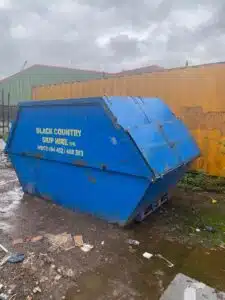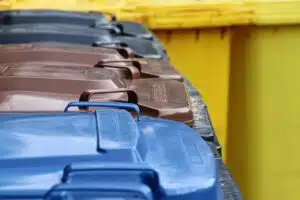
How to Prepare for the Delivery of a Skip
Like most places in the UK, Wolverhampton has strict regulations in place when it comes to hiring a skip…
Bilston, West Midlands WV14 0RX
Mon-Fri:07.00-16.30
Freephone
Both businesses and individuals are becoming increasingly aware of their impact on the environment, and how we manage and dispose of our waste has come under the spotlight even more in recent years. Most domestic households manage their waste and recycling themselves, but a larger business or company will likely use a professional waste removal company to take care of things on their behalf. From hiring a skip to take care of construction waste, to hiring a company to recycle different types of waste for you, there are many ways for waste to be removed and managed. The type of waste in question will also affect how it is managed; whether it be glass, plastic, wood or electronic waste.
The focus nowadays is strongly directed towards recycling, and sending as little waste as possible to landfill, but there are several ways that different types of waste are treated depending on what they are. If you’d like to know more about the removal and waste management processes for glass, wood, metal, plastic and more, then see below for our ultimate guide to the waste removal process.
Recycling and reusing wood prevents the need to cut down new trees, and also reduces the amount of waste sent to landfill. Wood waste is produced by several different sources, including construction, building sites, timber mills, furniture shops, and old pallets and wooden packaging.
However, in order for wood to be recycled it must be ‘clean’, which means untreated, painted, stained or contaminated. Clean wood can be collected and sent to a recycling plant where it is sent to a wood grinder or chipper to be ground up and recycled for use in chipboard, pulp and paper products, animal bedding, mulch or compost. To reduce the amount sent to landfill, it’s also useful to recycle treated or painted wood where possible, by turning it into garden furniture, storage or decking.
Plastic is becoming increasingly controversial as a material, and many companies are making great efforts to reduce or completely eliminate the amount of plastic used in their packaging or products. That said, plastic is still widely used so it’s vital that it is disposed of properly. There are several methods of plastic waste disposal, and recycling is arguably seen as the most important. Many types of plastic can be recycled into other plastic products such as bottles, traffic cones, packaging, kitchenware and even clothing.
If plastic cannot be recycled then it can be incinerated to create more energy, or sent to landfill, although this is considered the most wasteful option. Some plastics are also biodegradable, so they can be left to naturally decompose over time. There is some controversy surrounding this material however, as some believe they may release harmful metals into the environment.
Glass recycling has been commonplace since the 1970s, saving millions of tons of the material from heading to landfills each year. Glass waste is collected from domestic recycling bins, bottle bins, or in some cases skips (if the volume of glass waste is particularly high). It is then sent to a recycling plant where it can be sorted into three main colours; clear, green and brown, before being cleaned and sent on to a glass factory.
At the factory, glass is smelted down and reshaped into new products, including more glass bottles, construction materials, fibreglass, or unique gifts such as wine glasses or jewellery. .
Recycling paper saves the need for new trees to be cut down, and it is less energy and labour intensive than making new paper from wood pulp. Waste paper is collected from domestic or commercial recycling bins, and then taken to a recycling plant where it’s separated into types and grades. The different papers are then washed to remove inks, plastic, staples and glue, before being mixed with more water to make slurry.
Different products can then be added to the slurry to create new paper products, including newspaper, cardboard or office paper. The mixture is spread onto large sheets and left to dry before being cut up ready for use!
Metals can be split into two types; ferrous and non-ferrous, and recycling methods may differ slightly due to the different properties of these groups. Ferrous metals are made up of a combination of iron and carbon, and include metals like carbon steel, cast iron and wrought iron. Non-ferrous metals do not contain iron and include precious and non-precious metals such as gold, platinum, aluminium, copper and lead.
Most recycled metal is referred to as ‘scrap metal’; off cuts left over from the manufacture of vehicles, building supplies and other materials. After metal has been collected for recycling, it can be separated into scrap, and ferrous and non-ferrous if required. Sensors like infra-red scanning or x-ray are useful for picking out valuable metals such as copper or gold from amongst the scrap, and then the remaining scrap metal is melted down in a large furnace. Ferrous and non-ferrous metals melt at different temperatures, so separate furnaces are used depending on the metal type. Once melted, the metals are then purified (usually by electrolysis), cooled and solidified into bars ready for use.
Green waste simply refers to any organic waste that is biodegradable, including grass cuttings, twigs, plants, food scraps, egg shells and vegetable peelings. Roughly 94% of local councils now offer a green waste recycling scheme, and households are issued with green or brown recycling bins specifically for this type of waste. Some households may choose to add their green waste to a compost heap in the garden, but otherwise the waste will be collected by the council and taken to a special composting site to be recycled. Any non-compostable material is removed and the remainder is laid out to decompose; this is sped up by increasing the temperature to 60 degrees centigrade which encourages the enzymes and bacteria to break down the waste faster. The piles are turned frequently to allow oxygen to reach the microorganisms breaking down the waste; this entire process takes around 8 to 16 weeks.
Recycled green waste has many valuable uses, the most common is as a topsoil or soil component for the landscaping or agricultural industries. It can also be used as an environmentally friendly method of sewage disposal, or as a renewable energy source thanks to the biogas produced during the decomposition process.
Electronic waste refers to old, broken or obsolete electrical products such as televisions, computers, printers or mobile phones. Failure to properly recycle electronic waste can cause damage to both humans and the environment, due to components in these products such as heavy metals, so it’s vital that individuals and companies dispose of e-waste properly.
You can arrange for a professional recycling company to pick up your electronic waste, where it is then taken to be sorted into components such as metals which can be shredded or crushed, and those which must be removed, like batteries, toner cartridges and fluorescent lights. A magnet is passed over the waste fragments to remove any steel or iron, and then the e-waste is separated into its different components, including glass, plastic, aluminium and copper. These raw materials can then be sold on to recyclers or manufacturers to make new electronic products or other items.
As you can see, rubbish clearance and waste management can be a complicated process, with different methods used for each type of material. If you run a business or company that produces a large amount of waste, or work in construction and building, then in most cases it’s best to hire a professional company to dispose of your waste on your behalf.
If you’re in need of local skip hire in the West Midlands, get in touch with Black Country Skip Hire. We offer a range of sizes, from small skips to large, and go to great lengths to ensure all waste is disposed of in the most environmentally friendly way possible. With over 25 years of experience serving both domestic and commercial customers, we have everything you need to manage your waste efficiently. For more information or to discuss your requirements, give us a call today or visit our website.

Like most places in the UK, Wolverhampton has strict regulations in place when it comes to hiring a skip…

Like most places in the UK, Wolverhampton has strict regulations in place when it comes to hiring a skip…

Like most places in the UK, Wolverhampton has strict regulations in place when it comes to hiring a skip…

There are almost 12,000 local councils in the UK, from the smallest village and parish councils…

If you have a general waste bin at home or at work, you’ve probably noticed…

You can never be certain in the UK what the day will bring in terms of the weather…
Black Country Skip Hire is a leading skip hire company serving the West Midlands with a range of skips for hire, waste disposal and waste management services.
Closing Fri 20th December
Re-Open Mon 6th January
Please note: Skips will not be delivered or collected during this period